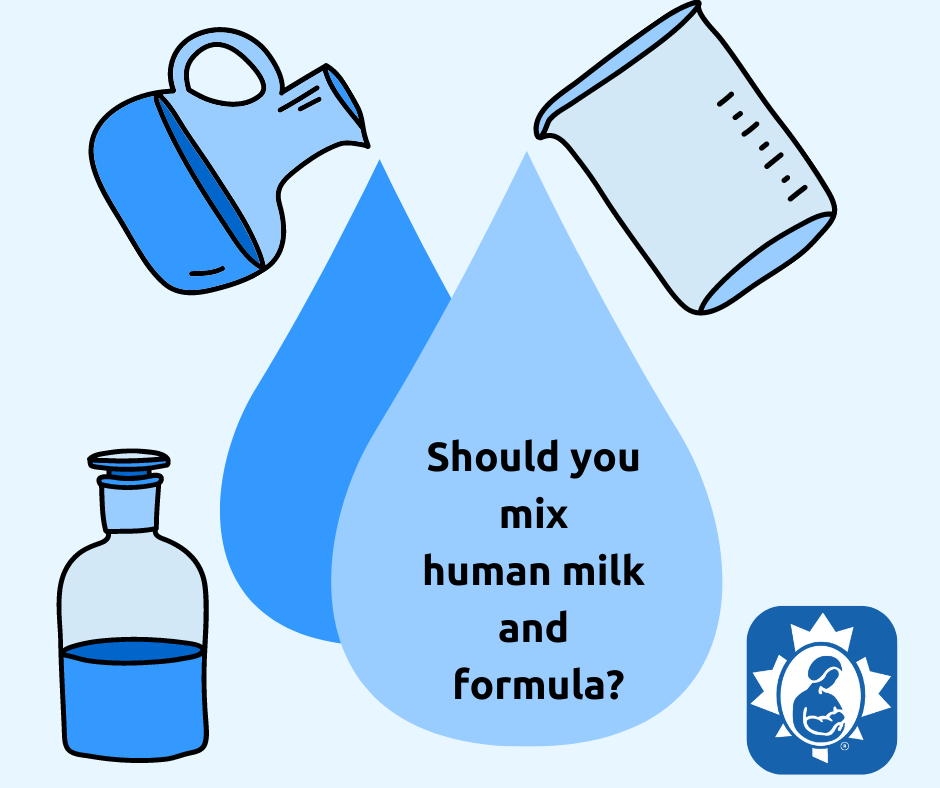
Health Canada recommends exclusive breastfeeding for the first six months of life, with continued breastfeeding for two years or more after the introduction of complementary foods around the middle of the first year of life. Exclusive breastfeeding means nothing but breastmilk: no water, no juice and no formula. Many mothers are happy to know that their milk is all their baby needs in the first six months or longer.
You may be supplementing because you are not producing enough milk for your baby. Or you may be using formula for other reasons. In either case, you likely have questions about whether or not it is okay to mix formula into your milk.
It is recommended that formula not be mixed with human milk for the following reasons:
- Formula and human milk have different storage guidelines. Any formula that your baby doesn’t drink from the bottle (or cup) must be discarded after the feeding. Human milk that your baby does not drink can be kept for between 1-2 hours in the refrigerator before being discarded. If you mix your milk with formula and your baby doesn't finish the bottle (or cup), it must be discarded. This could lead to unnecessary wastage of your milk.
- Mixing formula into human milk decreases some of the protective components of human milk. Research has found that when cow milk formula is mixed with human milk prior to feeding, there is a significant (41-74%) decrease in the activity of lysozyme, an antimicrobial enzyme in the milk. As a result, there is a significant increase in the growth of the harmful bacteria, E-coli, in the milk.
- Components in formula might bind to live components in human milk making them less absorbable by your baby’s body. For example, the added iron in formula can actually interfere with the absorption of the iron that is found in human milk.
It is recommended that you feed human milk separate from formula to maximize the benefits of human milk.
- You may be expressing milk or pumping to increase your milk supply. If you are not producing sufficient milk for each feeding, collect as many pumpings as necessary to make one exclusive human milk feeding and use formula at the other feedings as needed. You can give this supplement after nursing or you can give a small amount before nursing and give the remainder after nursing, as needed.
- You may be using formula regularly because of a low milk supply. In this case, knowing how formula interacts with your milk, can help you decide when to offer formula and when to give your milk.
- You may have a premature baby who requires human milk fortifiers. These can be added to your expressed milk.
If you have concerns about your milk supply or any other breastfeeding questions, please contact a La Leche League Canada Leader for information and support.
Please consider supporting LLLC.
Resources:
Formula and human milk have different storage guidelines. - See: Academy of Breastfeeding Medicine. (2017). ABM Clinical Protocol #8: Human milk storage information for home use for full-term infants. Breastfeeding Medicine, 12(7), 390-395. (This info is found in our LLLC Storing Human Milk info sheet.)
Mixing formula into human milk decreases some of the protective components of human milk. - See: Quan, R., Yang, C., Rubinstein, S., Lewiston, N. J., Stevenson, D. K., & Kerner, J. A., Jr (1994). The effect of nutritional additives on anti-infective factors in human milk. Clinical pediatrics, 33(6), 325–328. https://doi.org/10.1177/000992289403300602
Components in formula might bind to live components in human milk making them less absorbable by your baby’s body. - See: Mohrbacher, Nancy. (2020). Breastfeeding Answers: A Guide for Helping Families, Second Edition. Nancy Mohrbacher Solutions, Inc. p. 143. (This references: Domellof, M. Lonnerdal, B. Abrams, S.A., et al. (2002). Iron absorption in breast-fed infants: Effects of age, iron status, iron supplements, and complementary foods. American Journal of Clinical Nutrition, 76(1), 198-204.
Quan, R., Yang, C., Rubinstein, S., Lewiston, N. J., Stevenson, D. K., & Kerner, J. A., Jr (1994). The effect of nutritional additives on anti-infective factors in human milk. Clinical pediatrics, 33(6), 325–328.
Mohrbacher, Nancy. (2020). Breastfeeding Answers: A Guide for Helping Families, Second Edition. Nancy Mohrbacher Solutions, Inc.
Updated 2025
